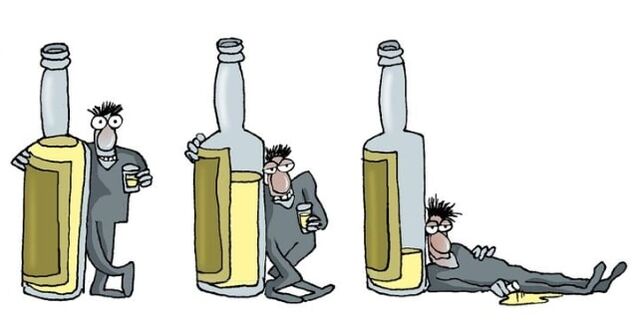According to statistics, men are twice as likely to be addicted to alcohol. Despite the fact that the consequences of alcoholism in men are very sad for both himself and his family, our society considers it normal to consume alcohol regularly.
This idea, of course, is catastrophic and needs to be reconsidered. Alcoholism is a serious disease that affects the human psyche and general health. Requires a comprehensive medical approach. Experience shows that even beer causes stable alcoholism. With it, the disease begins, and then a person turns to strong alcohol.
External signs of alcoholism
Addiction is formed and developed step by step. The presence and development of alcoholism in men can be recognized by a number of characteristic symptoms of alcoholism. Psychologists and narcologists have developed the main symptoms that can recognize the onset of alcoholism:
- an irresistible craving for alcohol, a person looking for the strangest reasons to justify his desire to drink;
- aggression against family members, friends, colleagues;
- lethargy and fatigue;
- speech disorders;
- musculoskeletal disorders;
- communicating with strangers;
- mood swings;
- deterioration of general health.
These are the first signs of alcoholism, which can last up to 10 years. As is often the case, it is easy to miss them at this stage. She just doesn't pay attention to them. He thinks that a person is relieved of stress after work, tries to avoid problems with a box of beer or a glass of brandy. At this time, the disease does not stop and continues to progress.
Causes of male alcoholism
The problem of male alcoholism stems from the difference between female and male psychology. Male sex is less adaptable to changing external conditions and uses alcohol to avoid problems and worries. In addition, men often resist persuasion to undergo rehabilitation, believing that they can cope on their own.
But this is not the case - in addition to physical dependence, alcoholism brings profound personality changes in the first months of abuse. Over time, the external environment consists of the same alcoholic beverages, which prevents recovery.
Every second family in our country will face the problem of alcoholism in the future or has already faced it. This affects all family members, especially children, without exception. In general, the causes of this dependence can be divided into three types:
- social;
- psychology;
- physiology.
They can appear individually or together. Social reasons include having friends around drinking. Social status plays a special role because people with good jobs and higher education are less likely to be addicted. It is especially important to emphasize the presence of stress in the workplace, the level of well-being.
Psychological factors are:
- mental imbalance;
- insufficient level of self-government;
- poor motivation for professional and mental development;
- presence of complexes;
- Unbelieving.
There are a number of other factors that can cause alcoholism in men. Here are just the most common ones.
There is another group of factors that cause chronic intoxication - physiological factors. These are metabolic diseases that cause the rapid development of addiction and hereditary factors. If there were cases of alcoholism in previous generations, it is likely to be relevant for future generations. A person thinks that he will not be addicted and can easily give up alcohol at any time. A similar phenomenon is characteristic of alcoholism at all stages of alcoholism.
You can recognize alcohol by its eyes and gaze. Ethanol has a negative effect on the eyes, becomes "glassy" and tired. Over time, bags and puffiness appear under the eyes. Such a person looks tired. This indirectly indicates the presence of diseases of the internal organs.
A person who drinks regularly often smells of alcohol "smoke", which is difficult to mix with another. People suffering from alcoholism generally do not take good care of their hygiene and appearance, and do not hesitate to wear wrinkled and dirty clothes.
Stages of alcoholism and their symptoms
There are several stages of alcoholism in men. There are only three in a row. The later treatment is started, the harder it is to succeed - psychological dependence and social lifestyle deny the course of treatment.

Signs of the first stage
In the early stages of the development of alcoholism is characterized by a gradual increase in the amount of alcohol consumed. There are various reasons for this, such a person begins to look for any reason to drink. At the same time, get more drunk every time. Relatives may hear excuses for this behavior:
- I want to rest.
- Others drank more than I did.
- Yes, I drink a lot, but I'm not a drinker.
- I'm tired of work and want to rest.
If these expressions are accompanied by aggression, it is a clear sign of the development of addiction. In addition, this stage is characterized by other physiological symptoms:
- lack of gag reflex;
- more is required to achieve the same degree of intoxication;
- there are cuts.
All these manifestations lead to deterioration of general health, deterioration of concentration and reduced efficiency. They are more visible during the transition to the next stage.
At this stage, a person needs to start treatment for alcoholism - the earlier the stage, the higher the probability of a successful outcome. In the first stage, intoxication is completely cured and the body returns to its original state after recovery, because the organs did not have time to suffer much and their functions were not much impaired.
One cannot imagine life without alcohol. He spends all his free time like this. For this reason, problems can arise in the workplace, as an employee who often comes with insomnia works worse. As a result, clashes broke out with colleagues and management. There are many problems in family life.
Signs of the second stage
In men, other symptoms appear in the second stage of alcoholism. Symptoms or dependencies of withdrawal are more pronounced here. Nausea is a headache. There may be darkness. Frequent sleep and digestive disorders. The craving for alcohol is no longer irresistible. In the second stage, he can not refuse to drink alcohol. It is the main priority that all life returns to.
Also, this stage of the disease is characterized by mental disorders - alcohol psychosis. It is expressed in an unstable emotional state, frequent manifestations of aggression, inappropriate behavior and unreasonable irritability.
Signs of the third stage
This is the last stage of alcoholism. At this stage, the patient must be hospitalized immediately to save his life. Complete distortion of personality and indifference to moral values. The main goal of an alcoholic is to get a new part, and he can do anything for it, including breaking the law. This also happens:
- intoxication comes in small doses;
- drowsiness is very difficult;
- Sleep, like food intake, depends on the amount consumed.
According to medical statistics, the average lifespan of an alcoholic at this stage is not more than five years. The following symptoms may appear due to constant poisoning of the body:
- intellectual disorder;
- speech loss or severe disorders;
- The risk of stroke, heart attack, stroke, severe liver and kidney dysfunction is high.

If these symptoms start to appear, you should understand that the addiction only increases. The key to effective and successful treatment is the patient's desire to get rid of their addiction. The situation is aggravated by the fact that alcoholics are often drunk and unable to make informed decisions. This greatly complicates the dialogue with such a person.
Beer alcoholism should be noted separately. Now this problem is getting worse in society. As a rule, many are convinced that beer can not cause alcoholism. Narcologists have a different opinion on this issue - frequent consumption of beer can lead to persistent alcoholism. This manifests itself in the need to drink constantly and in large quantities. The number of drunks is gradually increasing. In this case, it is worth ringing the alarm and starting the rehabilitation process to get rid of this addiction.
Consequences of alcoholism in men
No matter how strong the body, the consequences of alcoholism in a man will not be long in coming. They can be conventionally divided into two types - psychological and physiological. Second, it can manifest itself in disorders of various body systems:
- Human impotence. Under the influence of alcohol, the hormonal background changes, testosterone production is disrupted.
- Digestive system problems. There may be gastritis, intestinal ulcers, stomach diseases.
- Pressure problems. Alcohol destroys the vascular system.
- Liver pathology. Frequent use of alcohol causes cirrhosis and liver cancer.
- Weak immunity. The body loses its protective properties, and often infectious diseases occur.
- Heart problems. Alcoholics are several times more likely to have a heart attack than non-drinkers.
Alcoholism also affects the human psyche. These disorders can manifest themselves in strange behaviors:
- A sense of persecution. It seems that they are watching him.
- Appearance of hallucinations. Under the influence of alcohol, the brain can create the illusion of sight and hearing.
- Encephalopathy. It is associated with poor circulation and poor nutrition of brain cells.
If such cases occur, you should immediately consult an authorized psychologist working with alcoholism. It is important to know that you can start treatment for alcoholism in a man at any stage.
Steps to recovery
- Step 1. Go to a private clinic
- Step 2. Convince the addict for treatment
- Step 3. Detoxification (cleansing the body of toxins)
- Step 4. Comprehensive rehabilitation in an inpatient center
Only in a rehabilitation center will a person be brought to full treatment not only by overcoming physiological dependence, but also with the help of inpatient treatment, and will accompany the first steps of life after rehabilitation.
Of course, the sooner the professional help of narcologists is provided, the faster and easier the process of recovery from this disease will be. Therefore, if you have the slightest doubt, contact a specialist immediately.
























